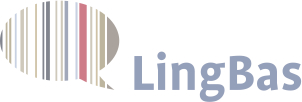Update: Feb. 18, 2014
| 14.00 – 14.30 h |
Felix Bildhauer & Roland Schäfer (Freie Universität Berlin) |
Web data as a challenge for theoretical linguistics and corpus design (Introduction) |
| 14.30 – 15.00 h |
Sonja Müller (Universität Bielefeld) |
How webdata can challenge traditional generalizations: a case study of the order of modal particles in German |
| 15.00 – 15.30 h |
Susanne Flach (Freie Universität Berlin) |
Solving the rare phenomenon problem? 'Quasi-serial' verb constructions in English |
| 15.30 – 16.00 h |
Dirk Goldhahn & Uwe Quasthoff (Universität Leipzig) |
Using corpus-based statistics for linguistic typology |
| 16.00 – 16.30 h |
Coffee break |
|
| 16.30 – 17.00 h |
Adrien Barbaresi (ENS Lyon) |
For a few points more: improving decision processes in web corpus construction |
| 17.00 – 17.30 h |
Lea Helmers (Freie Universität Berlin) |
Named entity recognition on German web corpora |
| 17.30 – 18.00 h |
Vladimír Benko (Slovak Academy of Sciences) |
Near-duplicate data in web corpora |
| 18.00 h |
Jack Grieve (Aston University), Asnaghi Costanza (Università Cattolica del Sacro Cuore) & Tom Ruette (Humboldt-Universität zu Berlin) |
Googleology is good science |
| 9.00 – 10.00 h |
Stefan Evert (invited talk) |
An NLP approach to the evaluation of web corpora |
| 10.00 – 10.30 h |
Ines Rehbein (Universität Potsdam) |
Using Twitter for linguistic purposes – three case studies |
| 10.30 – 11.00 h |
Kazuya Abe (Atomi University) |
Twitter corpus and collection of German phrases |
| 11.00 – 11.30 h |
Coffee break |
|
| 11.30 – 12.00 h |
Tom Ruette (Humboldt-Universität zu Berlin) & Jack Grieve (Aston University) |
Cognitive sociolinguistics with Twitter: why do the Dutch swear with diseases? |
| 12.00 h |
Peter Grube (Martin-Luther-Universität Halle-Wittenberg) |
A diachronic corpus of personal weblogs: possibilities and current constraints |



